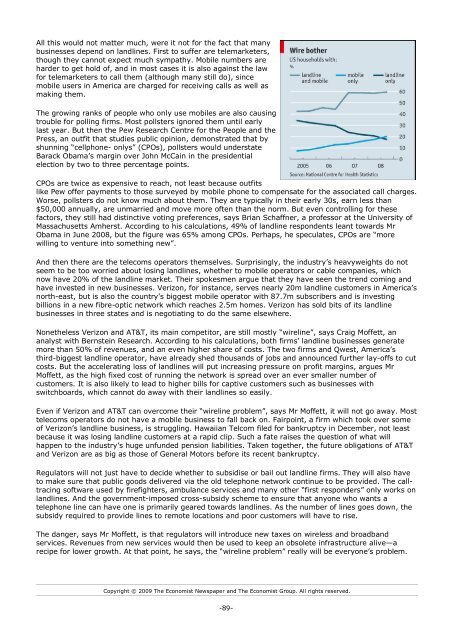Untitled - the ultimate blog
Untitled - the ultimate blog
Untitled - the ultimate blog
You also want an ePaper? Increase the reach of your titles
YUMPU automatically turns print PDFs into web optimized ePapers that Google loves.
All this would not matter much, were it not for <strong>the</strong> fact that many<br />
businesses depend on landlines. First to suffer are telemarketers,<br />
though <strong>the</strong>y cannot expect much sympathy. Mobile numbers are<br />
harder to get hold of, and in most cases it is also against <strong>the</strong> law<br />
for telemarketers to call <strong>the</strong>m (although many still do), since<br />
mobile users in America are charged for receiving calls as well as<br />
making <strong>the</strong>m.<br />
The growing ranks of people who only use mobiles are also causing<br />
trouble for polling firms. Most pollsters ignored <strong>the</strong>m until early<br />
last year. But <strong>the</strong>n <strong>the</strong> Pew Research Centre for <strong>the</strong> People and <strong>the</strong><br />
Press, an outfit that studies public opinion, demonstrated that by<br />
shunning “cellphone- onlys” (CPOs), pollsters would understate<br />
Barack Obama’s margin over John McCain in <strong>the</strong> presidential<br />
election by two to three percentage points.<br />
CPOs are twice as expensive to reach, not least because outfits<br />
like Pew offer payments to those surveyed by mobile phone to compensate for <strong>the</strong> associated call charges.<br />
Worse, pollsters do not know much about <strong>the</strong>m. They are typically in <strong>the</strong>ir early 30s, earn less than<br />
$50,000 annually, are unmarried and move more often than <strong>the</strong> norm. But even controlling for <strong>the</strong>se<br />
factors, <strong>the</strong>y still had distinctive voting preferences, says Brian Schaffner, a professor at <strong>the</strong> University of<br />
Massachusetts Amherst. According to his calculations, 49% of landline respondents leant towards Mr<br />
Obama in June 2008, but <strong>the</strong> figure was 65% among CPOs. Perhaps, he speculates, CPOs are “more<br />
willing to venture into something new”.<br />
And <strong>the</strong>n <strong>the</strong>re are <strong>the</strong> telecoms operators <strong>the</strong>mselves. Surprisingly, <strong>the</strong> industry’s heavyweights do not<br />
seem to be too worried about losing landlines, whe<strong>the</strong>r to mobile operators or cable companies, which<br />
now have 20% of <strong>the</strong> landline market. Their spokesmen argue that <strong>the</strong>y have seen <strong>the</strong> trend coming and<br />
have invested in new businesses. Verizon, for instance, serves nearly 20m landline customers in America’s<br />
north-east, but is also <strong>the</strong> country’s biggest mobile operator with 87.7m subscribers and is investing<br />
billions in a new fibre-optic network which reaches 2.5m homes. Verizon has sold bits of its landline<br />
businesses in three states and is negotiating to do <strong>the</strong> same elsewhere.<br />
None<strong>the</strong>less Verizon and AT&T, its main competitor, are still mostly “wireline”, says Craig Moffett, an<br />
analyst with Bernstein Research. According to his calculations, both firms’ landline businesses generate<br />
more than 50% of revenues, and an even higher share of costs. The two firms and Qwest, America’s<br />
third-biggest landline operator, have already shed thousands of jobs and announced fur<strong>the</strong>r lay-offs to cut<br />
costs. But <strong>the</strong> accelerating loss of landlines will put increasing pressure on profit margins, argues Mr<br />
Moffett, as <strong>the</strong> high fixed cost of running <strong>the</strong> network is spread over an ever smaller number of<br />
customers. It is also likely to lead to higher bills for captive customers such as businesses with<br />
switchboards, which cannot do away with <strong>the</strong>ir landlines so easily.<br />
Even if Verizon and AT&T can overcome <strong>the</strong>ir “wireline problem”, says Mr Moffett, it will not go away. Most<br />
telecoms operators do not have a mobile business to fall back on. Fairpoint, a firm which took over some<br />
of Verizon’s landline business, is struggling. Hawaiian Telcom filed for bankruptcy in December, not least<br />
because it was losing landline customers at a rapid clip. Such a fate raises <strong>the</strong> question of what will<br />
happen to <strong>the</strong> industry’s huge unfunded pension liabilities. Taken toge<strong>the</strong>r, <strong>the</strong> future obligations of AT&T<br />
and Verizon are as big as those of General Motors before its recent bankruptcy.<br />
Regulators will not just have to decide whe<strong>the</strong>r to subsidise or bail out landline firms. They will also have<br />
to make sure that public goods delivered via <strong>the</strong> old telephone network continue to be provided. The calltracing<br />
software used by firefighters, ambulance services and many o<strong>the</strong>r “first responders” only works on<br />
landlines. And <strong>the</strong> government-imposed cross-subsidy scheme to ensure that anyone who wants a<br />
telephone line can have one is primarily geared towards landlines. As <strong>the</strong> number of lines goes down, <strong>the</strong><br />
subsidy required to provide lines to remote locations and poor customers will have to rise.<br />
The danger, says Mr Moffett, is that regulators will introduce new taxes on wireless and broadband<br />
services. Revenues from new services would <strong>the</strong>n be used to keep an obsolete infrastructure alive—a<br />
recipe for lower growth. At that point, he says, <strong>the</strong> “wireline problem” really will be everyone’s problem.<br />
Copyright © 2009 The Economist Newspaper and The Economist Group. All rights reserved.<br />
-89-








![[ccebbook.cn]The Economist August 1st 2009 - the ultimate blog](https://img.yumpu.com/28183607/1/190x252/ccebbookcnthe-economist-august-1st-2009-the-ultimate-blog.jpg?quality=85)



![[ccebook.cn]The World in 2010](https://img.yumpu.com/12057568/1/190x249/ccebookcnthe-world-in-2010.jpg?quality=85)
![[ccemagz.com]The Economist October 24th 2009 - the ultimate blog](https://img.yumpu.com/5191885/1/190x252/ccemagzcomthe-economist-october-24th-2009-the-ultimate-blog.jpg?quality=85)